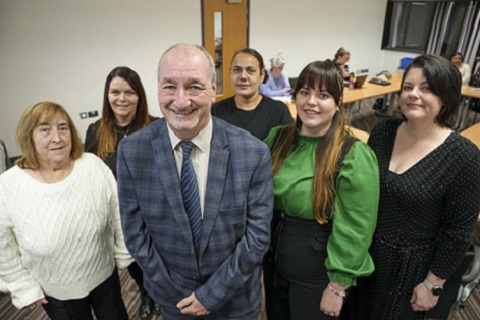The University of Wolverhampton is one of the top institutions nationally for local growth and regeneration, working with the public and third sector, and engaging with the public and community, according to new data.
Research England’s Knowledge Exchange Framework (KEF) looks at the diverse contributions of universities to help level up their local areas.
The KEF allows universities to better understand and improve their own performance in knowledge exchange. It provides businesses and other users with more information to help them access world-class knowledge and expertise within universities across the UK.
The KEF groups institutions into ‘clusters’– institutions with similar characteristics such as size, specialisation, how much research they do and in what subject areas. This is a more fair and balanced approach that avoids making unhelpful comparisons between incomparable institutions.
Wolverhampton is in Cluster E, which is described as “large universities with a broad discipline of teaching across STEM and non-STEM generating excellent research across all disciplines.” The University has scored highly for local growth and regeneration, public and community engagement, and working with the public sector and third sector – placing it at the forefront of the sector and outperforming others in our cluster.
Wolverhampton also increased its scores to ‘medium’ in research partnerships and CPD and grad start-ups, meaning all scores are ‘medium’ and above for all perspectives – improving its performance since KEF2.
Professor Prashant Pillai, Pro Vice-Chancellor for Research and Knowledge Exchange (pic), said: “We are delighted to have received recognition for our role as an anchor institution in our region. Our priorities are dictated by our place and communities and delivered through purposeful collaborative engagement.
“We work in partnership at all levels; a collaborative ethos and approach that enables us to make the most meaningful and significant contribution in supporting our students and communities. Creating and delivering life transforming opportunities in partnership with, and for, our students and our communities remains our core mission and institutional priority."
The University’s KEF submission included examples of key regeneration projects such as:
- A state-of-the-art £5m Screen School. Officially opened in March 2022 it is an ambitious epicentre for stimulating screen-based culture, education, research and industrial development within the region and beyond. Working with external stakeholders, it provides a diverse student talent pipeline to address the known and anticipated skills gaps.
- The Marches Centre for Excellence for Health and Social Care. Opened in May 2021, this centre proactively addresses shortfalls in health professionals across the Marches area with an emphasis on local people and students who will be become regional key workers. The £5million health and social care centre received £3.5m Growth Deal funding from the Marches LEP. It provides hands-on experience and training to the next generation of key workers and features state-of-the-art training facilities including simulation facilities.
- The establishment of a National Brownfield Institute (NBI) in September 2022 at Springfield campus, led by the University, in partnership and supported by key stakeholders to create a world-class industry cluster focusing on brownfield regeneration. The NBI has a particular focus on the digital skills needed to transform the industry, bringing together expertise from across the region and further afield looking at construction design, building information modelling (BIM), off-site, modular construction, and lean construction methodologies.
- The creation of a Cyber Quarter including the opening of the Midlands Centre for Cyber Security (MCSS) at Hereford in December 2021. The £9m state-of-the-art hub supports innovation and industry in the sector, offering a package of tailored security testing, training, R&D and sector expertise to businesses and investors.

















